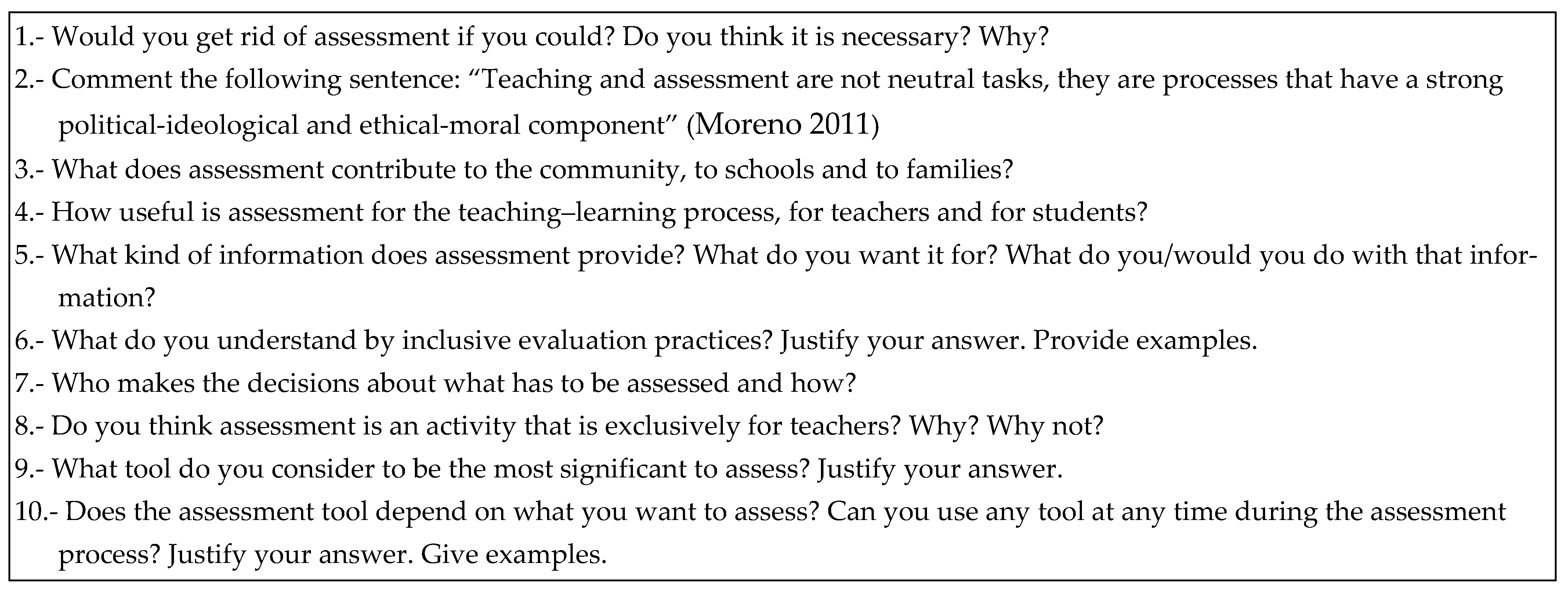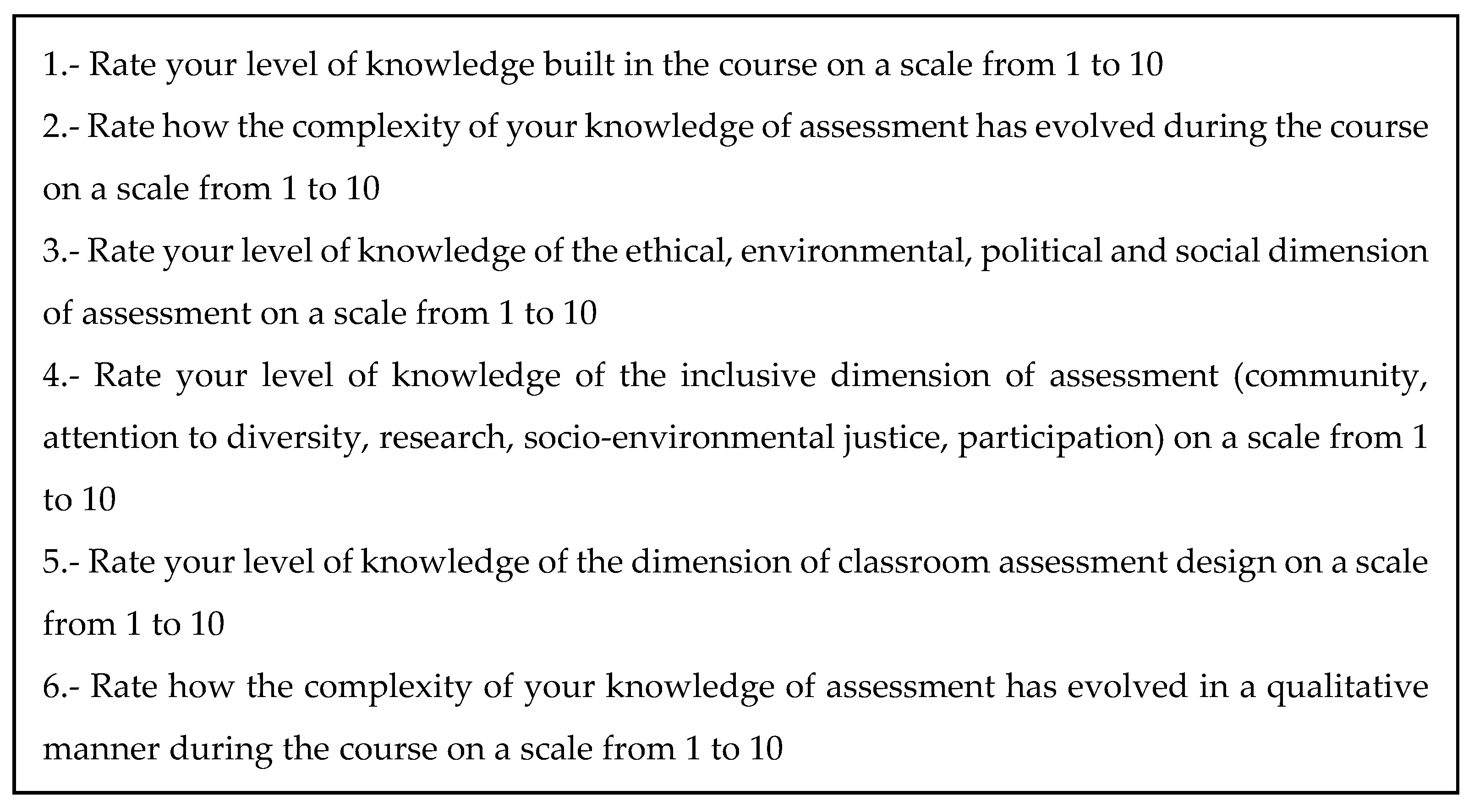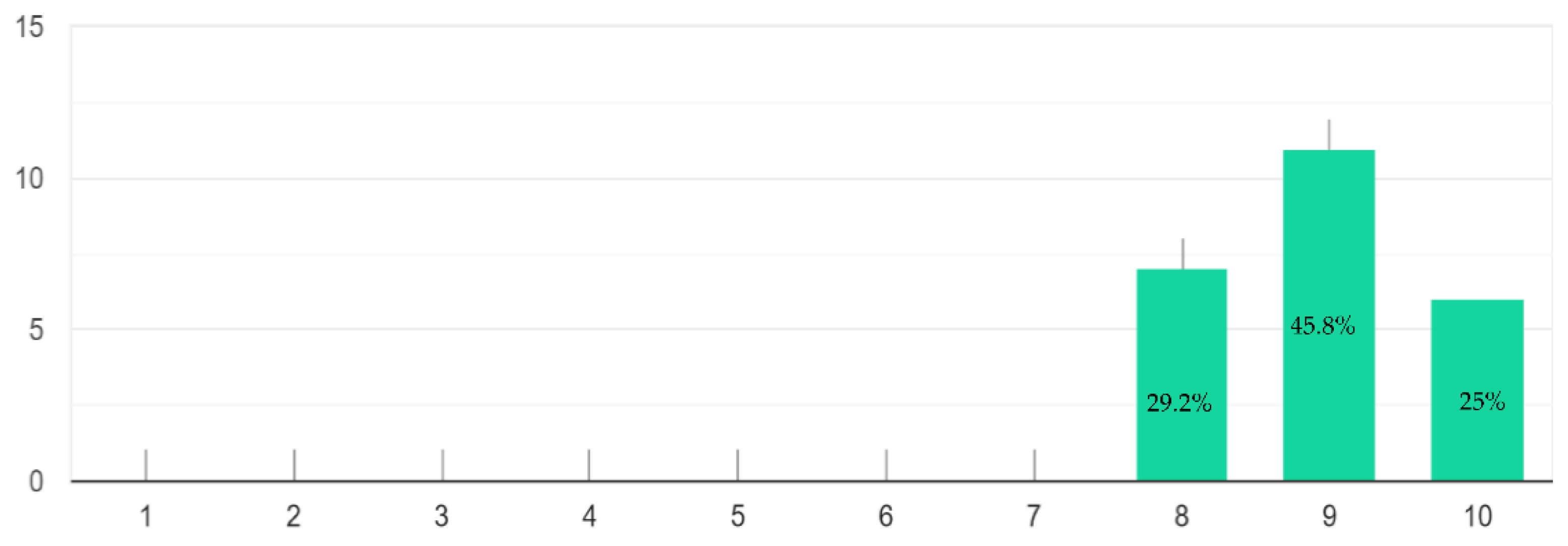Inclusive Assessment and Sustainability Dimensions: Pre-Service Teachers’ Ideas and Knowledge
Abstract
:1. Introduction
- -
- The creation of spaces for dialogue, communication, participation and consensus of the different people involved in the assessment processes, and as a management model of classrooms, schools and society.
- -
- The participation of students and other community agents in decision-making and in the processes involved in assessment.
- -
- The design and development of assessment tasks that acquire sense and meaning in relation to the environment and the socio-environmental reality.
- -
- The implementation of grounded and shared feedback processes.
- -
- The creation and use of shared assessment criteria and tools and rating systems consistent with the values related to sustainability and inclusion.
- -
- The diversification of assessment tasks and tools.
- -
- The establishment of horizontal relationships where the intrinsic value of each person, their ability and their right to always learn is appreciated.
- -
- The community implementation of action research processes that improve the rationality of assessment and educational practices in a given context of eco-social crisis.
- -
- The analysis of circumstances that generate situations of vulnerability, exclusion and deterioration of the environment.
- -
- The creation of spaces based on trust in the capacities of all people, on the honesty and transparency of assessment processes, and on the courage to disobey what is established by law if it is exclusive (standardised assessment tests).
- -
- The assumption of professional responsibility in converting assessment processes into sustainable and inclusive assessment practices, and in identifying and reducing barriers to learning and participation, as well as planning the necessary resources and support for diversity, adopting a cooperative attitude.
- -
- Analyse the development of pre-service teachers’ ideas and construction of knowledge regarding the socio-environmental and ethical dimension that affects assessment systems.
- -
- Analyse the development of pre-service teachers’ ideas and construction of knowledge regarding the classroom assessment design from the perspective of EfS and IE.
2. Methods
2.1. Research Context and Participants
Procedure
- (1)
- Development and creative presentation of a simulated situation in which they, as an educational team, had to build an assessment proposal from the perspective of EfS and IE for an early childhood or primary school. In this task, they had to build a theoretical-practical perspective regarding:
- the concept of educational assessment
- assessment and its relationship with the current socio-economic and political systems and the school context (they were given the description of a specific school)
- the role of assessment in a sustainable and inclusive school: key principles and curriculum organisation
- standardised assessments
- evaluating the school and the teachers (action research)
- (2)
- Classroom assessment design from the perspective of EfS and IE based on an initial design. To develop this design, different activities were carried out:
- analysis, in small groups, of an educational intervention proposal
- esign, in small groups, of an initial assessment proposal for the educational intervention proposal analysed in point a.
- whole-class discussion about different proposals to define assessment processes and their impact on teaching–learning processes
- analysis of the initial proposal of each small group together with the teachers to adapt the different elements of the assessment processes from the perspective of EfS and IE
- whole-class discussion about what they have worked on in small groups regarding the different elements that make up an assessment system from the perspective of EfS and IE so as to build a joint assessment system.
2.2. Data Collection Tools and Analysis Procedure
- -
- Individual initial questionnaire (IQ) of open-ended questions adapted from previous research [45], developed in the initial phase of the training process
- -
- Report of the theoretical-practical assessment proposal from the perspective of EfS and IE for a school (school-based educational project, or SEP), prepared in the intermediate phase
- -
- Classroom assessment design from the perspective of EfS and IE (CAD)
- -
- Final individual questionnaire (FQ) and questionnaire to evaluate the progression of knowledge (QEPK), built ad hoc, developed in the final phase of the process
3. Results
3.1. Socio-Environmental and Ethical Dimension
3.2. Dimension of the Classroom Assessment Design
4. Discussion
4.1. Analysis of the Progression of Pre-Service Teachers’ Ideas and Construction of Knowledge of the Socio-Environmental and Ethical Dimension That Affects Assessment Systems
4.2. Analysis of the Progression of Pre-Service Teachers’ Ideas and Construction of Knowledge of the Classroom Assessment Design from the Perspective of EfS and IE
5. Conclusions
5.1. General Conclusions
5.2. Limitations of the Study and Future Research
Author Contributions
Funding
Institutional Review Board Statement
Informed Consent Statement
Data Availability Statement
Acknowledgments
Conflicts of Interest
References
- UNESCO Education for Sustainable Development Goals: Learning Objectives; UNESCO: Paris, France, 2017.
- Gallego-Noche, B. El Buen Hacer en Educación. Narrativas Contrahegemónicas y Prácticas Inclusivas; Publicaciones UCA: Cádiz, Spain, 2019. [Google Scholar]
- García, M.C.; Cotrina, M.J. La contribución de la universidad al desarrollo de prácticas inclusivas: Dilemas y propuestas para avanzar compartiendo. Rev. Educ. Inclusiva 2012, 5, 123–138. [Google Scholar]
- Booth, T.; Ainscow, M. Index for Inclusion: Developing Learning and Participation in Schools, 3rd ed.; Centre for Studies in Inclusive Education (CSIE): Bristol, UK, 2011. [Google Scholar]
- Torres, J. La educación inclusiva como proyecto político. Cuad. Pedagog. 2015, 461, 8. [Google Scholar]
- Morin, E.; Hulot, N. El Año I de la Era Ecológica; Paidós: Barcelona, Spain, 2008. [Google Scholar]
- Bookchin, M. The Ecology of Freedom: The Emergence and Dissolution of Hierarchy; AK Press: Oakland, CA, USA, 2006. [Google Scholar]
- González García, F.; Fernández Ferrer, G. Investigación educativa Potencialidades y limitaciones de las analogías elaboradas por estudiantes de magisterio para representar las aguas subterráneas. Enseñanza Cienc. Tierra 2012, 20, 229–238. [Google Scholar]
- García-González, E.; Jiménez-Fontana, R.; Azcárate, P. Education for Sustainability and the Sustainable Development Goals: Pre-Service Teachers’ Perceptions and Knowledge. Sustainability 2020, 12, 7741. [Google Scholar] [CrossRef]
- García-González, E.; Jiménez-Fontana, R.; Azcárate, P. The training of future education professionals from the perspective of sustainability: A formative experience. In Proceedings of the INTED 2017, Valencia, Spain, 6–8 March 2017; pp. 8572–8579. [Google Scholar]
- Nieminen, J.H. Assessment for Inclusion: Rethinking inclusive assessment in higher education. Teach. High. Educ. 2022. [Google Scholar] [CrossRef]
- Murillo, F.J.; Duk, C. Una evaluación inclusiva para una educación inclusiva. Rev. Latinoam. Educ. 2012, 6, 11–13. [Google Scholar]
- Gallego Noche, B.; Serra, V.Q.; Ruiz, M.A.G.; Ibáñez, J.C. La evaluación y retroalimentación electrónica entre iguales para la autorregulación y el aprendizaje estratégico en la universidad: La percepción del alumnado. REDU. Rev. Docencia Univ. 2017, 15, 127–146. [Google Scholar] [CrossRef] [Green Version]
- Brown, G. Teachers’ conceptions of assessment: Implications for policy and profes-sional development. Assess. Educ. 2004, 11, 301–318. [Google Scholar] [CrossRef]
- Jiménez-Fontana, R.; García-González, E.; Azcárate, P. La evaluación como sistema en la educación para la sostenibilidad: El binomio Estructura-Función. Revalue 2016, 5, 1–23. [Google Scholar]
- McArthur, J. Assessment for social justice: The role of assessment in achieving social justice. Assess. Eval. High. Educ. 2015, 41, 967–981. [Google Scholar] [CrossRef]
- Boud, D.; Soler, R. Sustainable assessment revisited. Assess. Eval. High. Educ. 2015, 41, 400–413. [Google Scholar] [CrossRef] [Green Version]
- Hawe, E.; Dixon, H. Assessment for learning: A catalyst for student self-regulation. Assess. Eval. High. Educ. 2016, 42, 1181–1192. [Google Scholar] [CrossRef]
- Carless, D. Feedback for Student Learning. Available online: https://davidcarless.edu.hku.hk/feedback-for-student-learning/ (accessed on 15 March 2022).
- Bonil, J.; Sanmartí, N.; Tomás, C.; Pujol, R.M. Un nuevo marco para orientar respuestas a las dinámicas sociales: El paradigma de la complejidad. Investig. Esc. 2004, 53, 1–20. [Google Scholar]
- Jiménez-Fontana, R.; García-González, E.; Azcárate, P.; Navarrete, A. Dimensión ética de la sostenibilidad curricular en el sistema de evaluación de las aulas universitarias. El caso de la enseñanza aprendizaje de las Ciencias. Rev. Eureka Enseñanza Divulg. Cienc. 2015, 12, 536–549. [Google Scholar] [CrossRef]
- Matthews, K.E.; Tai, J.; Enright, E.; Carless, D.; Rafferty, C.; Winstone, N. Transgressing the boundaries of ‘students as partners’ and ‘feedback’ discourse communities to advance democratic education. Teach. High. Educ. 2021. [Google Scholar] [CrossRef]
- Quesada, V.; Gómez Ruiz, M.Á.; Gallego Noche, M.B.; Cubero-Ibáñez, J. Should I use co-assessment in higher education? Pros and cons from teachers and students’ perspectives. Assess. Eval. High. Educ. 2019, 44, 987–1002. [Google Scholar] [CrossRef]
- Alsalamah, A. Assessing Students in Higher Education in Light of UDL Principles. Am. Res. J. Humanit. Soc. Sci. 2020, 3, 24–27. [Google Scholar]
- Maxwell, T.W. Assessment in higher education in the professions: Action research as an authentic assessment task. Teaching in Higher Education. Teach. High. Educ. 2012, 17, 686–696. [Google Scholar] [CrossRef]
- Armstrong, F.; Moore, M. Action Research for Inclusive Education. In Changing Places, Changing Practice, Changing Minds; RoutledgeFalmer: London, UK, 2004. [Google Scholar]
- Waterfield, J.; West, B. Towards Inclusive Assessments in Higher Education Case Study. Learn. Teach. High. Educ. 2007, 3, 97–102. [Google Scholar]
- Wanner, T.; Palmer, E.; Palmer, D. Flexible assessment and student empowerment: Advantages and disadvantages–research from an Australian university. Teach. High. Educ. 2021. [Google Scholar] [CrossRef]
- Edwards, A. Playing to Their Strengths: Empowering Students with Flexible Assessment. Int. J. Innov. Sci. Math. Educ. 2020, 28, 16–27. [Google Scholar] [CrossRef]
- DiBenedetto, M.K.; Schunk, D.H. Assessing academic self-efficacy. In Academic Self-Efficacy in Education Nature, Assessment, and Research; Khine, M., Nielsen, T., Eds.; Springer: Berlin/Heidelberg, Germany, 2022; pp. 11–37. [Google Scholar]
- Schunk, D.H.; DiBenedetto, M.K. Academic self-efficacy. In Handbook of Positive Psychology in Schools; Furlong, M.J., Gilman, R., Huebner, E.S., Eds.; Routledge: Abingdon, UK, 2014; pp. 115–130. [Google Scholar]
- Janzen, R.; Ochocka, J.; Turner, L.; Cook, T.; Franklin, M.; Deichert, D. Building a community-based culture of evaluation. Eval. Program Plann. 2017, 65, 163–170. [Google Scholar] [CrossRef] [PubMed]
- Nicol, D. From monologue to dialogue: Improving written feedback processes in mass higher education. Assess. Eval. High. Educ. 2010, 35, 501–517. [Google Scholar] [CrossRef]
- Nicol, D. The power of internal feedback: Exploiting natural comparison processes. Assess. Eval. High. Educ. 2020, 46, 756–778. [Google Scholar] [CrossRef]
- Schildkamp, K.; Van der Kleij, F.M.; Heitink, M.C.; Kippers, W.B.; Veldkamp, B.P. Formative assessment: A systematic review of critical teacher prerequisites for classroom practice. Int. J. Educ. Res. 2020, 103, 101602. [Google Scholar] [CrossRef]
- Sanmartí, N. 10 Ideas Clave. Evaluar Para Aprender; Graò: Barcelona, Spain, 2007. [Google Scholar]
- Nind, M. Inclusive research and inclusive education: Why connecting them makes sense for teachers’ and learners’ democratic development of education. Camb. J. Educ. 2014, 44, 525–540. [Google Scholar] [CrossRef] [Green Version]
- Nind, M. The practical wisdom of inclusive research. Qual. Res. 2017, 17, 278–288. [Google Scholar] [CrossRef] [Green Version]
- Mingers, J. What is it to be Critical?: Teaching a Critical Approach to Management Undergraduates. Manag. Learn. 2000, 31, 219–237. [Google Scholar] [CrossRef]
- Muis, K.R.; Chevrier, M.; Denton, C.A.; Losenno, K.M. Epistemic Emotions and Epistemic Cognition Predict Critical Thinking About Socio-Scientific Issues. Front. Educ. 2021, 6, 1–18. [Google Scholar] [CrossRef]
- Robina-Ramírez, R.; Medina Merodio, J.A.; McCallum, S. What role do emotions play in transforming students’ environmental behaviour at school? J. Clean. Prod. 2020, 258, 120638. [Google Scholar] [CrossRef]
- Sasson, I.; Malkinson, N.; Oria, T. A constructivist redesigning of the learning space: The development of a sense of class cohesion. Learn. Environ. Res. 2022, 25, 183–197. [Google Scholar] [CrossRef]
- Moreno, T. Consideraciones Éticas en la Evaluación Educativa. Rev. Iberoam. Calidad Efic. Cambio Educ. 2011, 9, 130–144. [Google Scholar]
- Denzin, N.K.; Lincoln, Y.S. Introducción general. La investigación cualitativa como disciplina y como práctica. In El Campo de la Investigación Cualitativa; Denzin, N.K., Lincoln, Y.S., Eds.; Gedisa: Barcelona, Spain, 2011; pp. 43–116. [Google Scholar]
- Jiménez-Fontana, R.; Cardeñoso, J.M. Una aproximación a la evolución de las ideas de los futuros maestros tras una experiencia formativa. In Innovación Educativa en la Sociedad Digital; Sola Martínez, T., García Carmona, M., Fuentes Cabrera, A., Rodríguez García, A.M., y López Belmonte, J., Eds.; Dykinson: Madrid, Spain, 2019; pp. 965–978. [Google Scholar]
- Jiménez-Fontana, R. La Evaluación en la Educación para la Sostenibilidad Desde el Paradigma de la Complejidad. Ph.D. Thesis, Universidad de Cádiz, Cádiz, Spain, 2016. [Google Scholar]
- Flores, R.C. Representaciones sociales del medio ambiente. Perfiles Educ. 2008, 30, 33–62. [Google Scholar] [CrossRef]
- Santos Guerra, M.A. Dime cómo evalúas y te diré qué tipo de profesional y de persona eres. Rev. Enfoques Educ. 2003, 5, 69–80. [Google Scholar] [CrossRef]
- García, J.E. La transición desde un pensamiento simple hacia otro complejo en la construcción del conocimiento escolar. Investig. Esc. 1995, 27, 7–20. [Google Scholar]
- Azcárate, P. El profesor de matemáticas ante el cambio educativo: Una visión desde la complejidad. In Proceedings of the V Congreso Iberoamericano de Educación Matemática, Porto, Portugal, 2005; pp. 1–26. [Google Scholar]




| Structures | Relationships | Human Spirit |
|---|---|---|
| Equality Justice Equity Eco-centrism Rights Participation Community Freedom | Diversity Non-violence Confidence Compassion Honesty Courage | Cheerfulness Love Hope/Optimism Beauty Creativity |
| Level | D1: Socio-Environmental and Ethical Dimension | D2: Dimension of Classroom Assessment Design |
|---|---|---|
| 1 | They are not aware of the relation between the assessment system, its underlying values and its contribution to a sustainable and inclusive society. Their statements are inconsistent 1. They understand that assessment should not be influenced by values in the interest of impartiality. They consider assessment as a verification and/or administrative requirement. They connect the ethical-moral, political-ideological dimension of assessment with political and government systems. | They do not know, or hardly know, the complexity of assessment processes. They do not define the kind of assessment. The design mainly focuses on the assessment tools. Assessment is to verify student knowledge, and the teacher is considered to be the only agent. They do not describe any relationship between structure (what and how) and function (why and for what). |
| 2 | They are aware of ethical aspects related to assessment (e.g., purposes 2 and reasons 3 for assessing), but not of the need for assessment systems to be based on inclusive and sustainable values (ethical positioning) as a response to the transformation of eco-social conflicts. They develop the concept of inclusive assessment through knowledge of IE, but not of the particularity of assessment from this perspective. | They know some types of assessment (formative, summative, initial, continuous and final assessment), but they do not recognise the regulating role of assessment. The consider some of the elements of the assessment system in the design, but without establishing relations between them. They do not establish relationships between the “what for” and “why” of each one of them. |
| 3 | They establish a relationship between assessment and integration of inclusive values and of EfS. There is coherence between how assessment practices are understood and how they should be developed from the perspective of sustainability and IE to achieve a fairer and more sustainable society. | They clearly set out the role of assessment as a mechanism to adjust the teaching–learning process. They consider the different elements in the design. They establish relationships between the “why” and “what for” of assessment (function) and the “what” and “how” (structure), and vice versa, and how these relationships condition the “when”. They express and include principles of sustainability and inclusion. |
| Level | L1 | L2 | L3 | |||
|---|---|---|---|---|---|---|
| f | % | f | % | f | % | |
| Initial phase | 49 | 51.04 | 41 | 42.70 | 6 | 6.25 |
| Intermediate phase | 13 | 9.15 | 39 | 27.46 | 90 | 63.38 |
| Final phase | 14 | 9.72 | 37 | 25.69 | 93 | 64.58 |
| Score | Frequency | % |
|---|---|---|
| 6 | 1 | 4.2 |
| 7 | 6 | 25 |
| 8 | 9 | 37.5 |
| 9 | 6 | 25 |
| 10 | 2 | 8.3 |
| Score | Frequency | % |
|---|---|---|
| 7 | 1 | 4.2 |
| 8 | 7 | 29.2 |
| 9 | 11 | 45.8 |
| 10 | 5 | 20.8 |
| Level | L1 | L2 | L3 | |||
|---|---|---|---|---|---|---|
| f | % | f | % | f | % | |
| Initial phase | 51 | 53.12 | 31 | 32.29 | 14 | 14.58 |
| Intermediate phase | 13 | 31.7 | 25 | 60.97 | 3 | 7.31 |
| Final phase | 14 | 8.58 | 38 | 23.31 | 111 | 68.1 |
| Score | Frequency | % |
|---|---|---|
| 7 | 3 | 12.5 |
| 8 | 11 | 45.8 |
| 9 | 10 | 41.7 |
Publisher’s Note: MDPI stays neutral with regard to jurisdictional claims in published maps and institutional affiliations. |
© 2022 by the authors. Licensee MDPI, Basel, Switzerland. This article is an open access article distributed under the terms and conditions of the Creative Commons Attribution (CC BY) license (https://creativecommons.org/licenses/by/4.0/).
Share and Cite
Gallego-Noche, B.; García-González, E.; Jiménez-Fontana, R.; Azcárate, P. Inclusive Assessment and Sustainability Dimensions: Pre-Service Teachers’ Ideas and Knowledge. Sustainability 2022, 14, 9651. https://doi.org/10.3390/su14159651
Gallego-Noche B, García-González E, Jiménez-Fontana R, Azcárate P. Inclusive Assessment and Sustainability Dimensions: Pre-Service Teachers’ Ideas and Knowledge. Sustainability. 2022; 14(15):9651. https://doi.org/10.3390/su14159651
Chicago/Turabian StyleGallego-Noche, Beatriz, Esther García-González, Rocío Jiménez-Fontana, and Pilar Azcárate. 2022. "Inclusive Assessment and Sustainability Dimensions: Pre-Service Teachers’ Ideas and Knowledge" Sustainability 14, no. 15: 9651. https://doi.org/10.3390/su14159651
APA StyleGallego-Noche, B., García-González, E., Jiménez-Fontana, R., & Azcárate, P. (2022). Inclusive Assessment and Sustainability Dimensions: Pre-Service Teachers’ Ideas and Knowledge. Sustainability, 14(15), 9651. https://doi.org/10.3390/su14159651









